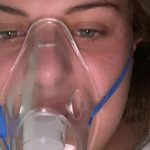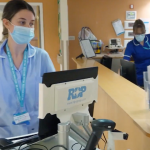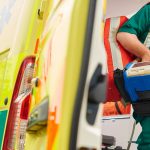NHS leaders have urged the government to reintroduce some coronavirus measures to avoid the UK “stumbling into a winter crisis”.
This month the average number of new COVID cases reported each day has risen by 16% to more than 43,000.
Chief executive of the NHS Confederation Matthew Taylor has warned: “The government should not wait for infections to rocket and NHS pressures to be sky high before the panic alarm is sounded.”
He claims that making face masks a legal requirement and discouraging people from meeting indoors and in large groups are “already common in parts of Europe” that have lower case rates.
While the government has ruled out another lockdown, it insists its “Plan B” for winter will be brought in should the NHS need it.
Here Sky News looks at whether the UK is being too relaxed on coronavirus – and how it compares to other countries.
How do the UK’s COVID restrictions compare to elsewhere?
Since 19 July in England, face masks and social distancing have only been a legal requirement in health and social care settings.
All areas of hospitality have reopened, with venues given the option to ask people for proof of a negative test, full vaccination or immunity from a recent infection.
The rules are slightly different in other parts of the UK, with vaccine passports mandatory in nightclubs and for large events in Scotland.
In Europe, however, varying forms of the EU’s digital COVID certificate have made testing or vaccination a legal requirement for most everyday settings – including restaurants and bars.
Since the launch of the “passe sanitaire” in France in August, other EU states have adopted similar strict rules, including mandatory face masks in most public spaces.
Are people still worried about COVID in the UK?
While the proportion of people wearing face masks in the UK is similar to some Western European countries – such as Germany – Imperial College London’s behaviour tracker shows a smaller percentage of people are avoiding public spaces in the UK than elsewhere.
Several months on from “Freedom Day”, scientists and healthcare workers have warned people not to think coronavirus has “gone away” just because restrictions have been lifted.
Professor Adam Finn, of the University of Bristol and the government’s Joint Committee on Vaccination and Immunisation (JCVI), has said the recent spike in COVID cases is a “reflection of how people are behaving”.
“There’s a general sense that life’s gone back to normal,” he told Sky News. “And as a result, the infection is being passed around.”
Professor Frank Furedi, sociologist at the University of Kent, claims there has been a “big shift in public opinion in recent months”.
“Keeping the virus under control is no longer the only priority,” he told Sky News.
He believes people are “prepared to trade off some of the risks of COVID for keeping their freedoms”.
“The satisfaction people get from public life means quite a lot to them now,” he said.
“And most importantly people are realising the damage COVID has done to the economy – with shortages and supply chain issues etc.
“People are thinking more and more about their jobs and their economic security.”
Please use Chrome browser for a more accessible video player
But Professor Chris Cocking, a social psychologist and expert in public behaviour at the University of Brighton, argues any concept of “behavioural fatigue” in relation to COVID is false.
“There has been a narrative presented by the government that the public is the weakest link,” he said.
“The public do understand the need for stronger measures – and when push comes to shove and things get really bad and they need to do something they are able to do that.
“Public behaviour in this pandemic has been much better than expected.”
What is the government saying?
The government says it will introduce its Plan B this winter only if there is a “significant risk of the NHS being overwhelmed”.
Despite cases approaching 50,000 a day, Number 10 claims the vaccine programme has weakened the link between spiralling infections and numbers dying.
And Business Secretary Kwasi Kwarteng has “ruled” out a winter lockdown.
Professor Furedi describes the UK government’s decision to no longer mandate mask wearing and social distancing as “libertarian”.
“I think the government is driven more now by perception of public opinion than the epidemiology of the virus,” he says.
“They have drawn the conclusion that infections are being driven by younger people and secondary school pupils… and they think the impact from that on the NHS can be relatively contained.”
But Professor Cocking describes “the idea the government is responding to public opinion” as “too simplistic”.
He stresses that infections have also risen significantly in the over-60s – not just the young.
“The public do understand the need for stronger measures,” he said.
“But the problem we have at the moment is there’s no consistency in approach.
“If you provide a clear message people can and will respond to it – despite great hardships to themselves.”
Do we still need measures if we have the vaccine?
Recent studies have shown that both the AstraZeneca and Pfizer vaccines are far less effective six months after the second dose.
Third doses are being offered to the over-50s, health and social care workers and the clinically vulnerable, but some experts have warned uptake is slowing and overall immunity is waning.
Epidemiologist Professor Andrew Hayward, of University College London, says that currently we are “entirely reliant on the vaccine programme to reduce hospitalisations and deaths”.
Speaking to Times Radio, he said this means more 12 to 15-year-olds need to get vaccinated and more people need to take up booster jabs.
He also believes government intervention is needed on masks, adding: “Evidence suggests that once government says it’s optional, people aren’t going to do it, so I think it’s in the government’s remit.”
The NHS Confederation claims there is “overwhelming evidence that we need to act” beyond current measures.
It says this includes “masks in crowded spaces, discouraging unnecessary indoor gatherings and working from home if you can”.
According to Dr Layla McCay, director of policy at the confederation, this is because COVID hospital admissions have risen by 10% in the past week.
“What we are seeing is this isn’t just a benign disease for a lot of people,” she told Sky News. “For plenty of people this is no laughing matter.”
Meanwhile, she says, pressure on the NHS is already “huge”.
“We have people who have postponed seeking help earlier in the pandemic, who now have quite complex needs, we’re working so hard to reduce the elective care backlog… and staff are exhausted with a lot of vacancies.
“Come winter, put all those things together and combined with increasing COVID cases, it puts us in a very difficult position.”
Is Plan B enough to avoid a winter lockdown?
NHS bosses and some scientists have claimed the government’s Plan B is not enough to combat “what could be the most challenging winter on record”.
Asked if the government’s current winter contingency plan will be enough to curb case numbers, Dr McCay told Sky News: “It probably isn’t going to be sufficient.
“But this is about when we take action.
“If you take some small changes now that reduce the risk of catching and passing on the virus, it might mean more drastic actions down the line won’t be needed.”
Mr Taylor, of the NHS Confederation, said he doesn’t believe measures such as closing schools and banning international travel are “necessary at this stage”.
But he said: “That is part of the argument – if we can do those things which are inconvenient but allow life to go on then we may not have to do things which will have a bigger impact.”
Professor Peter Openshaw, an expert in experimental medicine at Imperial College, added that it “doesn’t need to be a full lockdown… but we do need to redouble our efforts to prevent community transmission”.






















